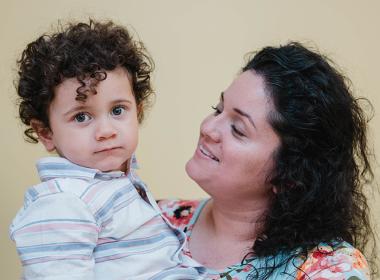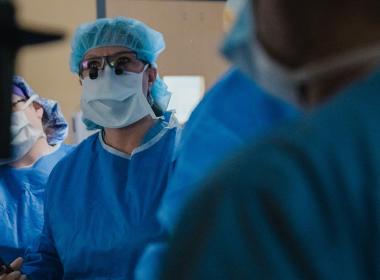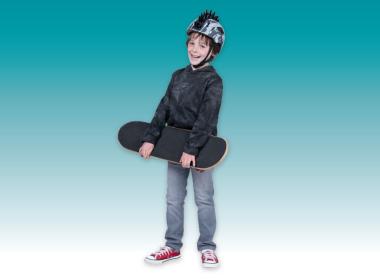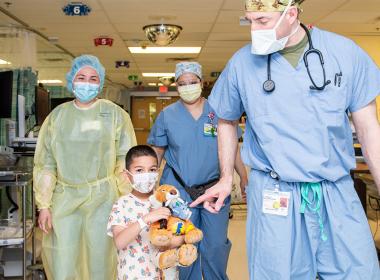Article
The New Food Pyramid: What Families Need to Know By Antoinette Maraglino, MS, RD: The good news? Healthy eating for kids hasn’t changed as much as it may sound.
Article
Grow Hopeful: Joseph’s Story “Nothing can prepare you for the moment when you realize you will not be able to hold your newborn,” says Marisol Casado. But there it was: Just 20 weeks into pregnancy, a routine ultrasound showed an abnormality in her baby’s heart.
Article
Legal Notice Pursuant to Section 19a-638(a)(5) of the Connecticut General Statutes, Connecticut Children’s Medical Center will submit the following Certificate of Need application: Applicant: Connecticut Children’s Medical Center Address: 56 Franklin Street, Waterbury, CT 06701 and 282 Article
Meet Dr. Finck: “Never Say You Can’t” By Christine Finck, MD, FACS: In honor of Women’s History Month, we’re celebrating the accomplishments of women in health care – including Christine Finck, MD, FACS, Connecticut Children’s first woman surgeon-in-chief and one of six women surgeon-in-chiefs at 45 children’s hospitals across the country.
Article
When Is It More Than a Stomach Virus? Understanding Abdominal Migraine in Children By Annette Vannilam, MD: Most parents are familiar with the stomach virus. It comes on suddenly, causes nausea or vomiting, and usually improves within a few days. But... If episodes of abdominal pain or vomiting keep coming back — especially when your child is completely fine in between — it may be time
Article
Kids in the Kitchen: Essential Cooking Skills for the Whole Family By Haley Duscha, RDN, CDN: Cooking can be an important part of eating healthy and finding variety in your meals, so it’s a good idea to get your child involved in the kitchen at an early age. But cooking skills aren’t just about how you mix ingredients. They also include how set up your kitchen – and any
Article
Reasons Your Child Should See a Pediatric Dietitian By Haley Duscha, RDN, CDN: A pediatric dietitian – also known as a registered dietitian nutritionist (RDN) – can be a great resource for your child and family. These experts take time to learn about food’s impact on your child, and can be a guiding hand in any nutrition concerns. Here’s why you may want to
Article
Grow Active: Finn’s Story If it races, rolls or jumps, 8-year-old Finnbar Prenty has probably mastered it – from skis to scooters to skateboarding. But not long ago, this kind of activity was out of the question. Finn began his health journey at another hospital in the state, where he was diagnosed with
Article
5 Tips for Healthy (and Realistic) Meal Planning – Including Travel and Dining Out By Haley Duscha, RDN, CDN: Do you plan your child’s meals and snacks in advance, or wait till it’s almost time to eat? A little bit of planning can help your whole family choose healthy options, save money, have more home-cooked meals… and not spend all day in the kitchen. Here are a few tips to kick-start Article
3 Mealtime Habits to Start With Your Family Today By Haley Duscha, RDN, CDN: March is National Nutrition Month, and Connecticut Children’s pediatric dietitians are bringing your family the advice you need to eat well! Scroll to the bottom for more healthy eating resources. Here, we share three mealtime habits that are key to good nutrition. Article
Is There a Best Way for Young Athletes to Warm Up for Sports? A good warm-up prior to exercise is one of the best ways for young athletes to prevent sports injury and perform at their best, when done properly. Plus, if a child learns how to properly stretch and warm up for sports at a young age, there is a greater chance that they’ll carry
Article
Beyond a Rare Heart Rhythm Disorder: Kayla’s Story By Dennis Mello, MD: To put it simply: Kayla doesn’t stop. At 16, she plays volleyball year-round, both with her high school varsity team and a national club team. She races motocross. She works two part-time jobs. She’s a National Honor Society student. She’s already thinking about college, law
Article
When Should Your Child See a Pediatric Sports Medicine or Physical Therapy Specialist? By Nicholas Giampetruzzi, PT, MPT: For young athletes to get the full physical, social and emotional benefits of their sport, they need support – at minimum, from their coach, teammates and family. But sometimes, kids could also benefit from a pediatric sports medicine expert, from doctors to physical therapists
Article
From Snowballs to Ski Slopes: Preventing Winter Injuries in Children By Kevin Borrup, DrPH, JD, MPA: If you are like me, then you appreciate all four seasons. Of them, winter is my favorite. Through our work in the Injury Prevention Center , an initiative of Connecticut Children’s Office for Community Child Health , I see how winter can be a time for incredible fun — snow forts
Article
How to Prepare Your Child for Surgery By Sarah Malvezzi: At Connecticut Children’s, we have a lot of practice caring for kids in a way that’s comfortable, empowering and even fun for them. If they have a surgery or procedure scheduled, you can count on us to keep them safe and sound every step of the way. You’ll probably want to